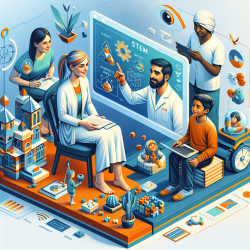Introduction
In the realm of speech-language pathology and online therapy services, understanding the dynamics of career development in STEM (Science, Technology, Engineering, and Mathematics) fields can offer valuable insights for practitioners. The research article "Perceptions of Skills Needed for STEM Jobs: Links to Academic Self-Concepts, Job Interests, Job Gender Stereotypes, and Spatial Ability in Young Adults" provides a comprehensive analysis of the factors influencing young adults' career choices in STEM. This blog aims to translate these findings into actionable insights for practitioners working with children and adolescents, particularly in enhancing their spatial skills and self-concepts.
Key Findings and Implications
The study highlights several critical factors that influence career choices in STEM fields:
- Spatial Skills: The research underscores the importance of spatial skills in STEM careers. It suggests that pre-college interventions aimed at improving these skills can significantly enhance students' interest in STEM fields.
- Gender Stereotypes: The study reveals that STEM jobs are often culturally stereotyped as masculine, which can deter women from pursuing these careers. Addressing these stereotypes is crucial for creating a more inclusive environment.
- Academic Self-Concepts: Students' self-perceptions of their abilities in math, science, and spatial skills directly influence their interest in STEM careers. Enhancing self-concept in these areas can lead to increased pursuit of STEM opportunities.
Practical Applications for Practitioners
For practitioners, especially those involved in online therapy services like TinyEYE, integrating these insights into practice can foster better outcomes for children:
- Incorporate Spatial Skill Development: Activities that enhance spatial reasoning, such as puzzles, building blocks, and interactive digital tools, should be integrated into therapy sessions to bolster spatial skills.
- Challenge Gender Stereotypes: Encourage discussions and activities that challenge traditional gender roles and stereotypes in STEM fields. Highlight successful female role models in STEM to inspire young girls.
- Boost Academic Self-Concepts: Use positive reinforcement and goal-setting strategies to improve students' confidence in their math and science abilities. Tailor interventions to individual needs to maximize impact.
Encouraging Further Research
While the study provides valuable insights, there is a need for further research to explore the long-term impacts of spatial skill interventions and stereotype challenges on career choices. Practitioners are encouraged to collaborate with researchers to develop and test innovative strategies that can be implemented in educational settings.
To read the original research paper, please follow this link: Perceptions of Skills Needed for STEM Jobs: Links to Academic Self-Concepts, Job Interests, Job Gender Stereotypes, and Spatial Ability in Young Adults.










